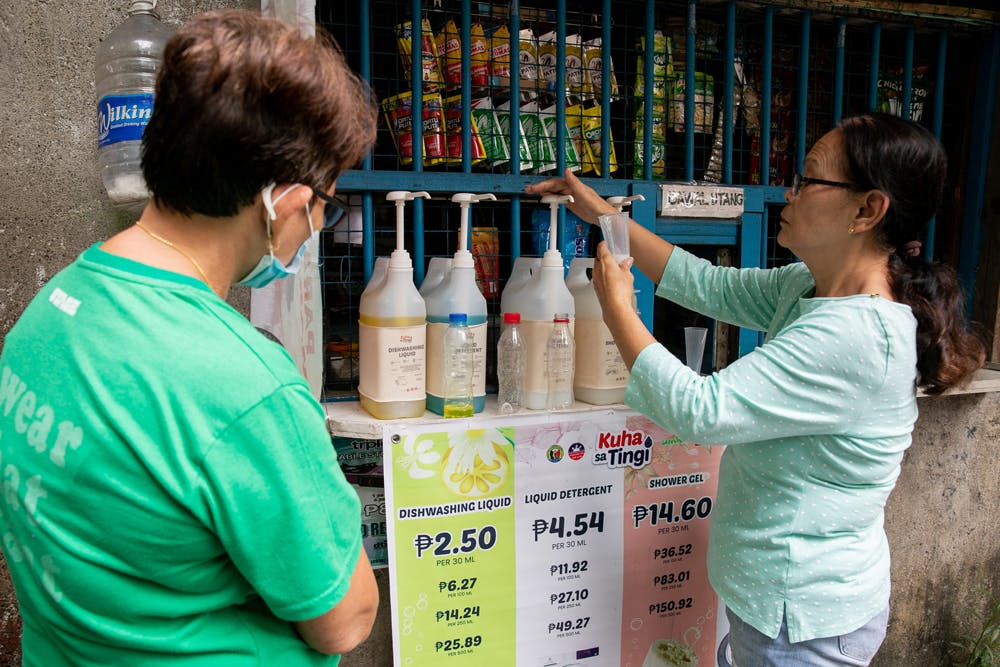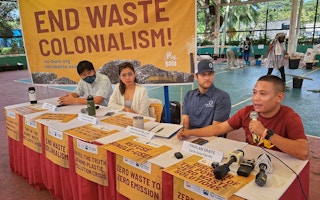Waste colonialism is not just about rich countries shipping their trash to poorer nations in the guise of recyclable waste.
To continue reading, subscribe to Eco‑Business.
There's something for everyone. We offer a range of subscription plans.
- Access our stories and receive our Insights Weekly newsletter with the free EB Member plan.
- Unlock unlimited access to our content and archive with EB Circle.
- Publish your content with EB Premium.
It is also about multinational companies using single-use plastics for packaging their products, leaving consumers in the developing world to bear the cost of managing their waste.
This was what environmentalists said at a press briefing on 24 January, after undertaking a brand waste audit of households in Navotas in Metro Manila, Philippines. The event capped off Zero Waste Month celebrations that originated in the Philippines more than a decade ago. The annual event aims to send the message that refilling and reusing are critical ways to achieve zero emissions.
In 2019, Canada, Australia, Hong Kong and South Korea came under fire for their shipment of tonnes of illegal waste to the Philippines, most of which contained mixed, unrecyclable and contaminated plastic waste, which goes against the Basel Convention, an international treaty that regulates the transboundary movements of hazardous wastes and other wastes and obliges the developed world to ensure that such wastes are managed and disposed properly.
“
If only companies would stop externalising the financial cost of their packaging because it is us the consumers who have to pay for managing their single-use plastic waste.
Froilan Grate, Asia Pacific coordinator, Global Alliance for Incinerator Alternatives (GAIA)
“Waste colonialism is manifested when companies continue to use single-use products in their packaging, a decision that comes from boardrooms in global north countries and corporations with no consideration for how these products and packaging would impact the markets where they would be sold,” said Froilan Grate, Asia Pacific coordinator of Global Alliance for Incinerator Alternatives (GAIA).
“If only companies would stop externalising the financial cost of their packaging because it is us the consumers who have to pay for managing their single-use plastic waste,” he added.
Waste colonialism is also when emerging economies in Asia are blamed for the world’s plastic pollution, said Coleen Salamat, plastic solutions campaigner at Ecowaste Coalition.
Last year, United States-based environmental advocacy Ocean Conservancy apologised for its 2015 study that pointed to China, Indonesia, Philippines, Thailand and Vietnam as the main culprits of global plastic pollution.
The research overlooked the role of industralised territories such as Europe, Japan, and the United States, in plastic overproduction and waste exports to developing countries.
Salamat cited a 2021 report that found how the 15 largest plastic manufacturers are based in Germany, Japan, Saudi Arabia, the United Kingdom and the US.
“Brand audits are proof that people are not the problem—these corporate polluters are,” said Salamat.
Consumer giants Coca-Cola, Nestlé, Pepsico, Procter & Gamble and Unilever have consistently ranked as the world’s biggest plastic polluters, according to annual surveys of plastic debris found on city streets, parks, forests, beaches, and coastal areas around the world in the past five years.
The same multinationals were found by a 2019 study to make up the 10 companies responsible for 60 per cent of residual waste in the Philippines.

A sari-sari store or small shop in San Juan, Metro Manila, offers product refills of various daily essentials in small quantities. Image: Greenpeace Philippines
Reviving the old-fashioned refill and reuse system
Environmentalists called on corporates to stop ignoring solutions from grassroots communities such as the refill and reuse system, where consumers purchase kitchen condiments, laundry products, and other household items by bringing clean and reusable bottles or containers to sari-sari stores or Fiipino versions of convenience shops.
“The refill and reuse system works. Don’t let the corporations tell you otherwise, and most importantly, don’t allow them to tell us that we’re too poor to afford the right environmental solutions, because people will choose it over something that will impact the environment and the future generation,” Grate said.
Plastic producers have said that single-use plastics cannot be cut from packaging because plastic substitutes are not yet available, and alternative environmental packaging is expensive.
Stores offering product refills are not a new idea in the Philippines. In the early 1990s, sari-sari store owners would pour vinegar or other products from a large bottle into a measuring cup, which is then be transferred into the customer’s empty container.
In a matter of decades, the refill culture was replaced by a culture of convenience dominated by fast-moving consumer goods packed in non-recyclable sachets.
But the refill system is increasingly making a comeback in cities and towns like San Fernando, Pampanga, Siquijor in Central Visayas, Bacolod, Negros Occidental and San Juan, Metro Manila.
Grate said: “These are not new concepts. We grew up bringing our own containers to sari-sari stores to refill cooking oil and other condiments. It is already embedded in our culture. If it works in Siquijor, it could work in Metro Manila and the whole country.”










